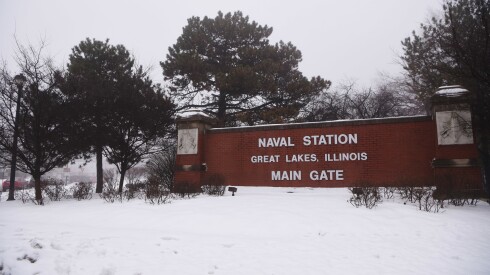A federal judge on Thursday handed a 12-year prison sentence to a former Navy sailor who “raised his hand, not to swear an oath to the Constitution, but to participate in an attack” on Naval Station Great Lakes as payback for the 2020 death of an Iranian military commander.
Xuanyu Harry Pang pleaded guilty in November to conspiring to destroy national-defense premises. Prosecutors asked U.S. District Judge Jeremy Daniel to give him a sentence of more than 13 years in prison, insisting that “very few people have demonstrated Pang’s willingness to support mass slaughter.”
“Pang sought to assist in an attack that, if real, could have resulted in the slaughter of his fellow Navy sailors, a monstrous betrayal,” assistant U.S. attorneys Aaron Bond and Vikas Didwania wrote in a 26-page court filing this month.
While Pang’s plot ultimately focused on the base about 40 miles north of Chicago, court records show Pang had also suggested an attack on Michigan Avenue downtown.
“You guys are looking for max damage, right?” Pang told someone working undercover for the FBI.
Didwania acknowledged during Thursday’s sentencing hearing that Pang wound up cooperating with authorities. Didwania said that factored into the feds’ sentencing recommendation. Portions of Thursday’s hearing also took place under seal at the request of Pang’s defense attorney, William Hardwicke. Members of the public and media were asked to leave the courtroom.
The judge later said he closed the courtroom out of concern for national security and Pang’s safety.
When the judge re-opened the courtroom, Hardwicke argued that Pang had been in the “midst of a mental health crisis” while helping plan the attack in 2022. Hardwicke also warned that Pang’s cooperation warranted a bigger sentencing break.
The feds’ recommendation, he said, “would have a chilling effect on cooperation in national security cases going forward.”
Daniel said he was “sensitive” to Hardwicke’s argument about Pang’s cooperation. The judge said it “was quick, and it was effective, and it was extensive, and for lack of a better term, complete.” But he said he’d only give Pang that credit after starting with the 20-year maximum sentence available to him. The judge ultimately discounted that sentence by 40%.
Authorities traced Pang’s planning back to 2020 or 2021, when they said Pang met someone who went by “Colombiano” and claimed to be part of Colombia’s National Liberation Army, or ELN. Pang wanted Colombiano to kill a drug dealer he believed had scammed him, the prosecutors wrote.
Pang and Colombiano turned to the encrypted WhatsApp platform and allegedly began discussing how to leverage ties to violent groups for profit. In June 2021, they allegedly discussed the sale of weapons that could cause “large-scale death and destruction” to the ELN and the Jalisco New Generation Cartel in exchange for money or gold.
“Pang specifically included weapons of war like anti-tank grenades, numerous missiles and missile launchers, rocket propelled grenades, and rocket launchers, among many other items,” Bond and Didwania wrote.
Pang and Colombiano also pondered a potential $5 million deal to help “the Iranians” move polonium into the United States for an attack with a radioactive bomb, according to the prosecutors. Authorities have described the substance as “not harmful outside the body. However, if ingested, it is lethal in extremely small doses.”
Then, in October 2021, Pang enlisted in the U.S. Navy. He reported to boot camp at Naval Station Great Lakes on Feb. 1, 2022, records show.
“Pang expected that, as a sailor, he would travel the world and meet potential new suppliers for firearms or new customers that he and Colombiano could do deals with,” Bond and Didwania wrote.
Pang signed up to become a fire controlman, the prosecutors added. That would have made Pang “responsible for launching missiles, like Tomahawks, that are on Navy ships,” according to their memo.
Pang also would have learned about Navy operations and the movement of ships.
It all “presented a terrific opportunity for Pang to profit from his Navy service by betraying his country and aiding terrorists, with no regard for the safety of his fellow servicemembers,” Bond and Didwania wrote.
It wasn’t until after his Navy enlistment that Pang and Colombiano began to plot an attack on the base, the prosecutors said. But Pang and Colombiano wound up discussing that plan with people working undercover for the FBI, unbeknownst to Pang.
In October 2022, Pang accepted $5,000 as payment for his help planning the attack, according to Pang’s plea agreement. Pang was told by one of the undercover operators it was meant to avenge the death of Qassem Soleimani, a commander in Iran’s Islamic Revolutionary Guard Corps killed in a U.S. drone strike.
Pang provided Navy uniforms and a cell phone that could be used as a detonator, as well as images of the base, according to the plea deal. During Thursday’s hearing, Didwania showed Daniel a video Pang had passed along of the guard shack at the base.
A sign prohibiting photography could be seen in the nighttime video. It appeared to have been recorded surreptitiously by Pang, as he returned to the base with other people who might one day have been among his victims.
“It really takes, I think, a special level of immorality to do something like that,” Didwania said.
